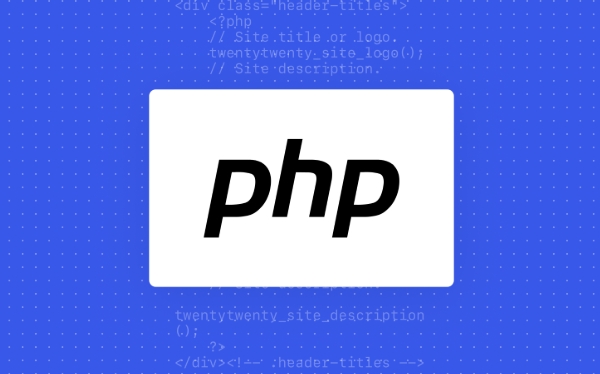 Backend Development
Backend Development
 PHP Tutorial
PHP Tutorial
 `define()` vs. `const`: A Deep Dive into PHP Constant Declaration
`define()` vs. `const`: A Deep Dive into PHP Constant Declaration
`define()` vs. `const`: A Deep Dive into PHP Constant Declaration
Jul 30, 2025 am 05:02 AMUse const first because it parses at compile time, has better performance and supports namespaces; 2. When you need to define constants in conditions, functions, or use dynamic names, you must use define(); 3. Only const can be used in classes to define constants; 4. define() can dynamically define expressions and complete namespace strings at runtime; 5. Once both are defined, they cannot be modified, but define() can avoid repeated definitions through defined(), while const cannot be checked; 6. The const name must be literal and does not support variable interpolation. Therefore, const is suitable for fixed and clear constants, and define() is suitable for scenarios that require runtime logic or dynamic naming. The selection should be based on specific requirements.

In PHP, defining constants is a common requirement in development, such as storing configuration items, status codes, or global invariant values. For a long time, PHP has provided two main ways to declare constants: define() function and const keyword. Although their goals are consistent - creating immutable values - there are important differences in usage scenarios, syntax limitations, and operational mechanisms. This article will analyze the difference between define() and const in depth to help you understand when to use which one.

1. Basic syntax and usage method
define() : Functional definition, runtime execution
define('PI', 3.14159); define('SITE_NAME', 'My Website');
-
define()is a function that can be called dynamically at runtime. - The first parameter is the constant name (string), and the second is the value.
- Expressions are supported as values (starting from PHP 5.6).
const : language structure, compile-time parsing
const PI = 3.14159; const SITE_NAME = 'My Website';
-
constis a language structure, not a function, and cannot be called dynamically. - The value must be determined at compile time and can only be used in top-level scopes or classes.
- The value must be a static scalar or scalar expression (PHP 5.6 supports simple operations).
2. Scope and definition location
This is one of the most significant differences between the two.
define() : Flexible scope control
- It can be called anywhere , including conditional statements, function inside, and loop.
if (true) {
define('DEBUG_MODE', true);
}
function setup() {
define('APP_PATH', '/var/www');
}
setup();? It is very convenient to define constants after dynamic judgment during runtime.

const : limited by compile-time parsing
- Only available in the top level of the file or in the class/interface/traits .
- It cannot appear in runtime structures such as conditions, functions, and loops.
if (true) {
const DEBUG = true; // ? Fatal error: const cannot be used in the condition} function foo() {
const BAR = 1; // ? Error}? Suitable for well-defined, fixed global constants or class constants.
3. Naming flexibility: dynamic vs static names
define() supports dynamic constant names
$env = 'prod';
define("API_KEY_$env", 'abc123');
echo API_KEY_prod; // Output abc123This is useful when configuring multiple environment constants.

The const name must be literal
const "API_KEY_$env" = 'abc123'; // ? Syntax error
Variable interpolation or dynamic naming is not supported.
4. Performance and parsing timing
-
constis parsed at the compilation stage , so it accesses slightly faster and is engine-optimized earlier. -
define()is executed only at runtime , with a slight overhead of function calling.
Although the performance difference is extremely small (microsecond level), const is better in high-frequency calling scenarios.
5. Use in the class
In a class, you can only use const , and you cannot use define() to define class constants.
class Status {
const PENDING = 0;
const APPROVED = 1;
}
echo Status::PENDING; // 0 Note: Class constants are accessed via :: , not $this-> .
define() defines global constants, even if written in class methods:
class Config {
public function set() {
define('MAX_SIZE', 1024); // Global constant, not part of the class}
}6. Variability and repeated definition
Once defined, neither can be modified or redefined (otherwise an error will be reported).
define('NAME', 'Alice'); define('NAME', 'Bob'); // ? Fatal error: constants are defined const NAME = 'Alice'; const NAME = 'Bob'; // ? Compilation error
But you can avoid repeated definitions by defined() :
if (!defined('NAME')) {
define('NAME', 'Alice');
} const cannot be checked like this, and it must be ensured that it does not repeat.
7. Namespace behavior differences
const follows namespace rules
namespace App; const PI = 3.14; // The actual constant is named App\PI
Pay attention to the namespace when accessing:
echo PI; // Find the PI under the current namespace echo \PI; // Force access to the global namespace
define() accepts the full name string
define('App\PI', 3.14);
The effect is equivalent to const , but it is more flexible.
Summary: When to use which one?
| Scene | Recommended method | reason |
|---|---|---|
| Global fixed configuration (such as API_URL) | const
|
Loading at compile time, good performance, clear |
| Class Constants | const
|
The only option |
| Definition after conditional judgment | define()
|
const does not support runtime logic |
| Dynamic constant name | define()
|
The const name must be static |
| Batch definition in configuration file | define()
|
More flexible |
| Namespace constants | Both are OK, const is more natural |
const automatically handles namespaces |
Tips
- Use
constfirst unless you need dynamic or conditional definitions. - Use
defined('CONST_NAME')to check if the constant exists. - Constant names are usually capitalized to enhance readability.
- PHP 7.0 supports better expression support for
const(such asconst MAX = 2 * 1024;).
Basically that's it. const is more modern and efficient, while define() is more flexible. Understanding their differences will allow you to write clearer and more reliable PHP code.
The above is the detailed content of `define()` vs. `const`: A Deep Dive into PHP Constant Declaration. For more information, please follow other related articles on the PHP Chinese website!

Hot AI Tools

Undress AI Tool
Undress images for free

Undresser.AI Undress
AI-powered app for creating realistic nude photos

AI Clothes Remover
Online AI tool for removing clothes from photos.

Clothoff.io
AI clothes remover

Video Face Swap
Swap faces in any video effortlessly with our completely free AI face swap tool!

Hot Article

Hot Tools

Notepad++7.3.1
Easy-to-use and free code editor

SublimeText3 Chinese version
Chinese version, very easy to use

Zend Studio 13.0.1
Powerful PHP integrated development environment

Dreamweaver CS6
Visual web development tools

SublimeText3 Mac version
God-level code editing software (SublimeText3)

Hot Topics
 Understanding Constant Expression Evaluation in PHP's Engine
Jul 29, 2025 am 05:02 AM
Understanding Constant Expression Evaluation in PHP's Engine
Jul 29, 2025 am 05:02 AM
PHPevaluatesconstantexpressionsatcompiletimetoimproveperformanceandenableearlyerrordetection.1.Constantexpressionevaluationmeanscomputingvaluesduringcompilationwhenalloperandsareknownconstantslikeliterals,classconstants,orpredefinedconstants.2.PHP’se
 Namespacing and Constants: Avoiding Collisions in Large-Scale Projects
Jul 30, 2025 am 05:35 AM
Namespacing and Constants: Avoiding Collisions in Large-Scale Projects
Jul 30, 2025 am 05:35 AM
Namespacingpreventsconstantcollisionsinlarge-scalesoftwareprojectsbygroupingrelatedconstantswithinuniquescopes.1)Constants,whichshouldremainunchangedduringruntime,cancausenamingconflictswhendefinedglobally,asdifferentmodulesorlibrariesmayusethesamena
 The Performance Paradigm: Analyzing the Speed of Constants vs. Variables
Jul 30, 2025 am 05:41 AM
The Performance Paradigm: Analyzing the Speed of Constants vs. Variables
Jul 30, 2025 am 05:41 AM
?Yes,constantsarefasterthanvariablesincompiledlanguagesduetocompile-timeevaluationandinlining.1.Constantsareevaluatedatcompiletime,enablingvalueinlining,constantfolding,andeliminationofmemoryallocation,whilevariablesrequireruntimeresolutionandmemorya
 Unveiling the Behavior of Constants within PHP Traits and Inheritance
Jul 29, 2025 am 03:58 AM
Unveiling the Behavior of Constants within PHP Traits and Inheritance
Jul 29, 2025 am 03:58 AM
PHPdoesnotallowconstantredeclarationbetweentraitsandclasses,resultinginafatalerrorwhenduplicateconstantnamesoccuracrosstraits,parentclasses,orchildclasses;1)constantsintraitsarecopieddirectlyintotheusingclassatcompiletime;2)ifaclassdefinesaconstantwi
 Demystifying PHP's Magic Constants for Context-Aware Applications
Jul 30, 2025 am 05:42 AM
Demystifying PHP's Magic Constants for Context-Aware Applications
Jul 30, 2025 am 05:42 AM
The seven magic constants of PHP are __LINE__, __FILE__, __DIR__, __FUNCTION__, __CLASS__, __TRAIT__, __METHOD__, and they can dynamically return code location and context information, 1. LINE returns the current line number, for precise debugging; 2. FILE returns the absolute path of the current file, often used to reliably introduce files or define root directory; 3. DIR returns the directory where the current file is located, which is clearer and more efficient than dirname (__FILE__); 4. FUNCTION returns the current function name, suitable for function-level log tracking; 5. CLASS returns the current class name (including namespace), in logs and factories
 Architecting with Immutability: Strategic Use of Constants in PHP
Jul 29, 2025 am 04:52 AM
Architecting with Immutability: Strategic Use of Constants in PHP
Jul 29, 2025 am 04:52 AM
ConstantsshouldbeusedtoenforceimmutabilityinPHPforbettercodeclarityandsafety;1)useconstantsforconfigurationanddomainlogiclikestatuscodesorAPIendpointstoavoidmagicvalues;2)preferclassorinterface-scopedconstantsoverglobalonestoimprovenamespacinganddisc
 `define()` vs. `const`: A Deep Dive into PHP Constant Declaration
Jul 30, 2025 am 05:02 AM
`define()` vs. `const`: A Deep Dive into PHP Constant Declaration
Jul 30, 2025 am 05:02 AM
Use const first because it parses at compile time, has better performance and supports namespaces; 2. When you need to define constants in conditions and functions or use dynamic names, you must use define(); 3. Only const can be used to define constants in classes; 4. define() can dynamically define expressions and complete namespace strings at runtime; 5. Once both are defined, they cannot be modified, but define() can avoid repeated definitions through defined(), while const cannot be checked; 6. The const name must be literal and does not support variable interpolation. Therefore, const is suitable for fixed and explicit constants, define() is suitable for scenarios that require runtime logic or dynamic naming.
 PHP Enums: The Modern Successor to Traditional Constant Groups
Jul 30, 2025 am 04:44 AM
PHP Enums: The Modern Successor to Traditional Constant Groups
Jul 30, 2025 am 04:44 AM
PHPenumsarethemodern,saferalternativetotraditionalconstantgroups.1.Theyprovidetypesafety,preventinginvalidvalues.2.TheyenableIDEautocompletionandbettertoolingsupport.3.Theyarefirst-classtypesusableintypehintsandinstanceofchecks.4.Theyallowiterationvi





